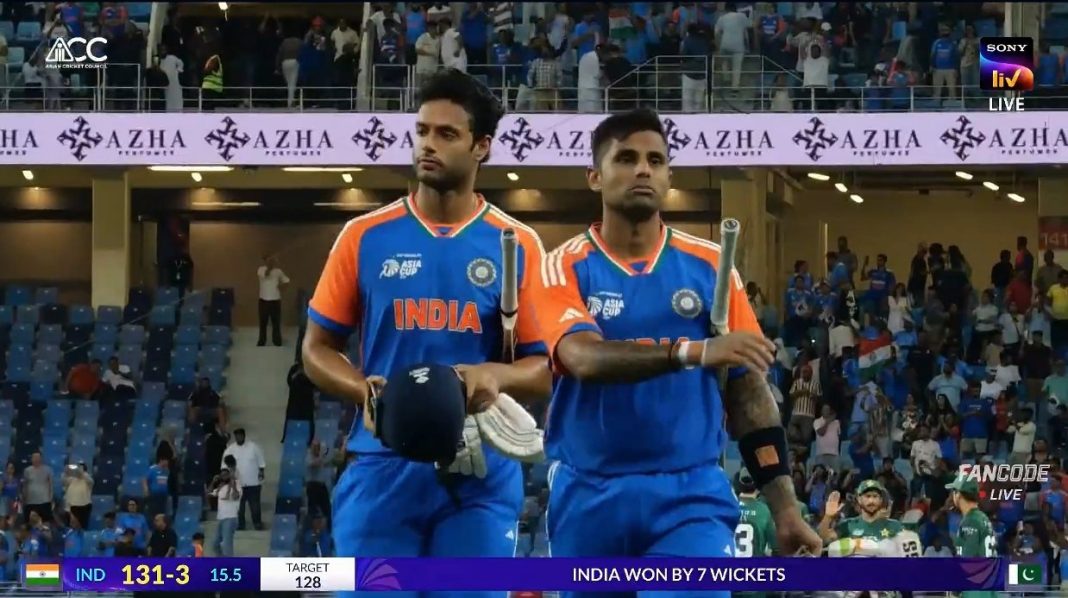The ongoing political standoff between India and Pakistan spilled onto the cricket field on Sunday, when India’s captain Suryakumar Yadav confirmed that his side deliberately avoided shaking hands with their rivals after their Asia Cup 2025 clash in Dubai.
The Group A encounter had been cleared only after lengthy deliberations by the Indian government, with hopes that cricket might soften political hostilities. Instead, Yadav dashed expectations, describing India’s emphatic seven-wicket win as a “perfect reply” to Pakistan in the aftermath of a four-day border conflict that brought the two countries to the brink of war in May.
INDIA staff close the door no handshake 🤝 🇮🇳#INDvsPAK pic.twitter.com/XjzzNRznKW
— Oggy (@evermedicine1) September 14, 2025
“Our government and the BCCI were aligned on playing this match. We came here just to play and gave them [Pakistan] a perfect reply,” Yadav said in the post-match press conference.
What happened after the match?
Yadav, who hit the winning runs alongside Shivam Dube, walked straight off the field without approaching Pakistan’s captain or team for the customary handshakes. Pakistan’s players gathered as usual, expecting the ritual, but the Indian squad instead exchanged handshakes only among themselves before retreating to their dressing room and shutting the door.
Indian team refuses to shake hands with Pakistan, Pakistan have raised a complain with the match refree. pic.twitter.com/seVJEmqKG4
— Sergio (@SergioCSKK) September 14, 2025
Why did India refuse the handshake?
When asked if the act contradicted the spirit of cricket, Yadav was blunt: “A few things in life are above sportsmanship.” He said the victory was dedicated to victims of the April 22 Pahalgam terror attack and to the Indian armed forces involved in Operation Sindoor—India’s missile strikes on six sites inside Pakistan, which New Delhi claimed were in retaliation.
The Pahalgam attack killed 26 tourists in Indian-administered Kashmir. Although armed group The Resistance Front claimed responsibility, India alleged Pakistani involvement. Pakistan then launched retaliatory strikes on Indian military installations, before a ceasefire was brokered four days later.
Utterly disappointing to witness the lack of sportsmanship today. Dragging politics into the game goes against the very spirit of sports. Lets hope future victories are celebrated by all teams with grace
— Mohsin Naqvi (@MohsinnaqviC42) September 14, 2025
Did India break rules?
Despite the optics, India’s decision was sanctioned by officials. According to Al Jazeera, match referee Andy Pycroft had asked both captains to skip the handshake at the toss, and later allowed India to forgo post-match handshakes as well. However, Pakistan’s team was not informed, leading to the awkward scenes at the end.
Pakistan’s manager Naveed Akram Cheema lodged a protest with Pycroft, who later apologised. Pakistan captain Agha refused to attend the customary post-match chat with broadcasters, while head coach Mike Hesson confirmed this was in response to India’s actions.
“We went over to shake hands, but they had already gone into the changing room,” Hesson explained.
Why do handshakes matter in cricket?
Handshakes at the end of matches are a long-standing tradition, symbolising sportsmanship and mutual respect. Typically, the batting pair of the team chasing shakes hands with the fielding side and umpires before walking off. Their teammates then join in to exchange handshakes with the opposition.
Captains also shake hands before the toss, which is conducted on the field by the match referee and broadcast live. While the ritual is symbolic, its absence in Dubai underlined just how deeply political tensions have seeped into cricket’s most high-profile rivalry.














